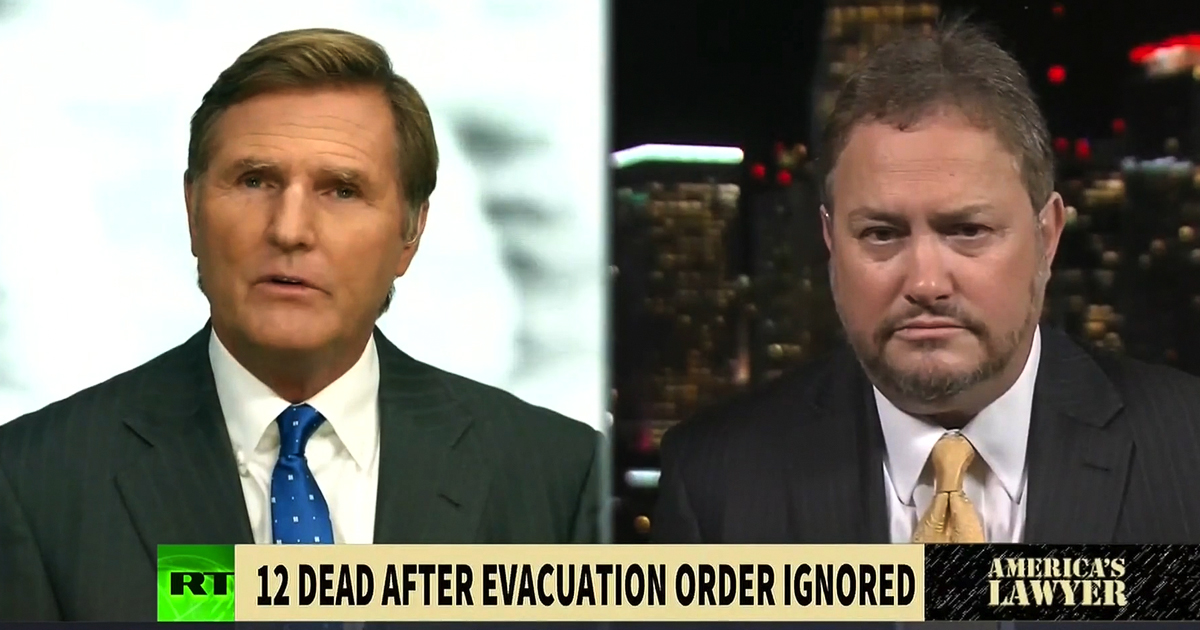To learn more about this topic, visit AL.Law
Via America’s Lawyer: Mike Papantonio and attorney Dan Soloway discuss how a nursing home in southern Florida refused to evacuate their residents as hurricane Irma was about hit leaving nearly one dozen elderly citizens dead.
Transcript:
Mike Papantonio: The abuse of the elderly in nursing homes is one of the most overlooked stories in the United States. Each day, our family members face nightmarish conditions under un-skilled caregivers’ attention. Abuse can come in many forms. The most obvious to us is physical abuse. But other forms, like verbal & emotional abuse and neglect, are the ones that so often go unreported, and they are just as serious and dangerous as physical abuse that can cost people their lives.
According to statistics compiled by the Nursing Abuse Guide, the problem might be even worse than the few reports on the issue have stated. Here’s what they’ve found:
Between 1999 and 2001, almost one-third of all nursing home facilities were cited for violations of federal standards that could cause harm, or that DID harm elderly residents of those facilities;
Nearly 10% of nursing homes had violations that posed a risk of serious injury or death of elderly residents;
More than 40% of nursing home residents have reported abuse, and more than 90% report that they or another resident of the facility have been neglected or abused;
Research from 2010 indicates that up to half of all nursing home attendants have admitted abusing or neglecting elderly patients;
In the aftermath of Hurricane Irma in the state of Florida, we saw another form of abuse take place. Even though massive evacuations had been ordered for most of the state, an elder care facility called The Rehabilitation Center at Hollywood Hills decided to ignore the evacuation orders and kept more than 100 elderly residents at the facility – even though one of the largest and most secure hospitals in the state was right across the street.
In the days after the storm, the facility was left with no electricity or running water, leaving residents to become dehydrated and overheated. As a result 11 elderly residents died. A massive investigation is underway to determine what happened and why the facility didn’t evacuate the residents, and even the governor has stepped in to demand answers. But unfortunately for Florida governor Rick Scott, the story that is now developing is one that shows he and his administration had completely ignored the calls for help coming from residents of that nursing home.
For more on this story let’s go to Dan Soloway. Dan, tell us what we know so far about these nursing home deaths following Hurricane Irma. How did these people die?
Dan Soloway: Well Mike, the people died because they essentially cooked to death. The transformer was knocked out from the hurricane, so there was no power powering the air conditioning. And because there was no generator, excessive heat, excessive temperatures subjected the residents of the nursing home to outrageous conditions, they started dying. Because no calls were made, no 911 calls were made, essentially they were found dead in their beds. By the time an accounting was made, eight people were dead within the first day of the power being knocked out, so because they didn’t have generators to generate the substitute power, the extreme temperatures couldn’t be abated, they died.
Mike Papantonio: There’s a massive investigation happening right now with law enforcement officers. Is there any information out there yet on what they found as far how bad this really was? What a collection of idiotic moves by this nursing home brought this all about. What do you know about it?
Dan Soloway: They determined that some calls were made by the nursing home but they weren’t made to 911, they were made to statewide helplines, even the Governor’s cellphone was accessed because the governor was on TV all the time giving that number out, but they did nothing to call an emergency situation to the attention of the first responders. Nothing really happened until a nurse at the hospital across the street starting noticing people coming into the emergency room with these extreme temperatures, and I mean body temperatures over 108. These people were either dead or they’re dying. She went across the street, looked in the nursing home and what the investigation is showing is that she’s the one who called the emergency because she actually found people dead in their bed or suffering such horrific conditions that they were very close to death. This investigation is going to reveal a whole lot more, but what they’re finding is that the nursing home basically ignored an emergency situation making non emergent calls at best.
Mike Papantonio: Florida Governor Rick Scott has said recently, I think his quote was something to the fact that the more we learn about this, the more concerning the tragedy is. He’s pretty on spot on this analysis, but I think what’s so interesting about this, is we’ve learned that his office actually deleted voicemails from the victims that could have shed some light on what failed in this response. Tell us about what you know there.
Dan Soloway: Well what I know is that the Governor initially said nobody called. Nobody made any calls whatsoever to the helpline. Then the nursing home was able to prove through documentation that they had made phone calls to both the state helpline and the Governor’s cellphone. Well then the Governor came back and admitted, ‘Okay they made phone calls, but these weren’t the type of calls that you would expect like an emergency was going on, there was serious medical needs to be attended to.’ And the hospital in responding said, ‘That is not true. They were exactly emergency calls, not just from us, but from people associated with us.’ Then the next thing we know the Governor says he deleted those phone calls. So we’ll never know which one is the lying side. Is it the nursing home that said these were emergent calls, or is it the government and the Governor who said they were non emergent just our power’s out type call?
Mike Papantonio: Dan, I know you’ve handled some of the biggest nursing home cases in the state, what’s interesting thing in my mind is what’s next for the victims, the families of the victims, because in Florida our legislators just gutted the ability of an individual to recover for these types of deaths. They made it to where, A: nursing home doesn’t even have to carry insurance. If they carry insurance, they have all kinds of immunities before you can even get paid on that insurance. This is a story that probably needs to revisit who the legislators were. Who the lobbyists were that have made it so difficult for people to recover in a nursing home case in Florida? What’s your take on that legal aspect of this story?
Dan Soloway: Well that may well be the second tragedy, that these families have very little if any access to the courts. They have arbitration clauses that are put into the nursing home contract that essentially waives their right to go to court, to have a jury trial so that they can have a fair and reasonable assessment of their damages. In addition, you have the availability of punitive damages to punish the wrongdoing nursing home and to send a message to other nursing homes to not engage in this misconduct. All that would be waived through the contract in these arbitration clauses where instead of a public proceeding, it’s a secret proceeding. Instead of all the reasonable measures available to both compensate and punish, very little of that is available. I mean what happened here is the industry stepped in. They got rid of the watchdog and they diluted or destroyed all the regulations that protected the nursing home residents. We’re left with a system that treats our seniors like dogs.
Mike Papantonio: This story is tragic. There’s no question about that, but doesn’t this appear to be part of the larger issue of systemic abuse of the elderly in nursing homes. We’re not saying just in Florida. I mean you’ve got some of the best litigators in this country like yourself, that have tried to take on so many of these nursing homes, not just in Florida, but there are roadblocks everywhere. The legislators have made roadblocks everywhere because money has been poured in to get these legislators to do that. You’ve got so much lobbying influence, so much political influence that these nursing homes have, that right now if you’re putting a loved one in a nursing home, buddy, most of the time it is your own risk. What’s your take on that, or is that an overstatement on how serious the problem has become with elder abuse in these nursing homes?
Dan Soloway: It’s not an overstatement in the least. I think it’s a dead on correct statement. It’s a systemic problem. In the 1980’s, when nursing home residents were protected a great deal by the ombudsman while the industry poured all this money into the system, the legislators and the Governor came in. The Governor immediately removed the watch dog and put in a lightweight, so we’ve got a fox guarding the hen house when it comes to our World War II veterans and our seniors in nursing homes who are subjected to regulations that don’t have their safety at heart. Don’t allow for adequate compensation. Have these arbitration clauses as I mentioned. You’ve got a system where even President Obama he made these arbitration laws, or these arbitration clauses illegal, and as soon as President Trump came in he removed that regulation and now we’re spending our money through Medicare and Medicaid and it’s lining the pockets of the nursing home industry to the detriment of the nursing home residents. It’s a systemic problem.
Mike Papantonio: Dan, what kind of issues do families need to be aware of when they consider sending a loved one to a nursing home? If you’re going down a checklist, and again I don’t want to overstate this, you really are considered one of the best litigators in this state. I know you’ve been confronted with this many times where you have to sit down with families and you have to say, ‘Well here’s what went wrong. You didn’t look at A, B, and C.’ Upfront, what do you tell a family to look for when they put somebody in a nursing home?
Dan Soloway: Mike, I don’t just litigate these cases, but I am this person. I have my own family and my in-laws who I’m looking at nursing homes at right now and I have a mental checklist. I mean the first question I have is am I stuck putting them in a nursing home in Florida because I don’t want them to be subjected to these arbitration clauses. We don’t have the long term care insurance available to me, so we are dependent upon private funds and Medicaid to pay for their nursing home. I mean I go up on the internet and I make sure at least that the places I’m looking at to put my family in that they have above average ratings through Medicare.
I think everybody should go and do an onsite inspection. When I look at these facilities I check and see are they new? Are they clean? Do they have a good ratio of staff to patient? Is there something that doesn’t smell right, doesn’t feel right? I don’t think anything can beat an onsite inspection, but you know, and my family is subjected to that just like all the families in Florida. You know they’re run by shadow LLC’s that you know if we bring a claim against them, there’s no guarantee there’s going to be insurance to pay the judgment and if we sue them, by the time we win the case they end up closing up shop, starting up a new LLC and there’s nobody to bring a claim against. I’m horrified that I’m subjected to it. I’m wishing the best for myself and for everyone else.
Mike Papantonio: So your advice is get out of Florida. Dan Soloway thank you for joining me and we’re going to be talking more about this as this case develops.



